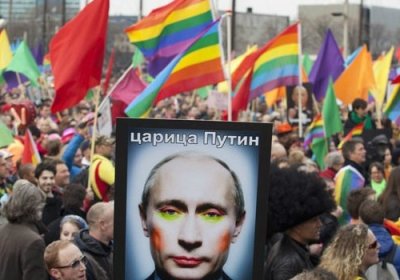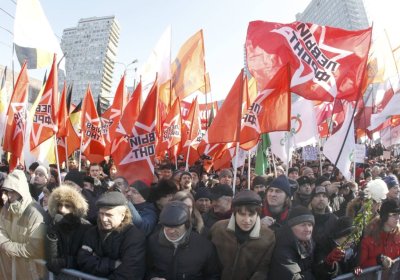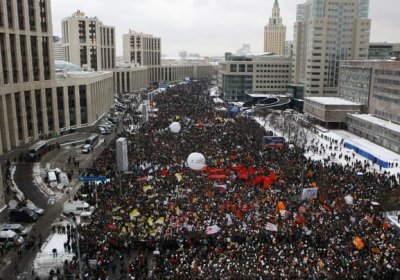Russian President Vladimir Putin announced legislation on March 18 accepting the formerly Ukrainian Republic of Crimea and City of Sevastopol into the Russian Federation. The legislation was passed by the Russian Duma (parliament) on March 20.
Crimea and Sevastopol had voted in a March 16 referendum to leave Ukraine and join Russia. This was the culmination of a process that began after the February 21 overthrow of unpopular Ukrainian president Viktor Yanukovich by protesters in the capital Kiev.
Russia
Jean-Luc Melenchon is co-president of France's Left Party and a member of the European parliament. Melenchon is also leader of the broader Left Front, involving other parties such as the French Communist Party, on whose ticket he won about 11% of the vote in the 2012 presidential elections.
Below, Melenchon gives his perspective on the crisis in Ukraine ― from Russia's actions in Crimea, to the West's saber rattling, to the mass protests that brought down an unpopular government and the new regime, featuring fascist forces, that has taken its place.
The February 21 collapse of the government of Ukrainian president Viktor Yanukovich in the face of anti-corruption protests has led to the most serious confrontation between the US and Russia since the end of the Cold War.
The Russian Federation is not the superpower the Soviet Union once was, but it remains the world’s second largest nuclear power after the US, which has about 80% of the world’s nuclear weapons.
The US and its allies are insisting that Ukraine is indivisible, including the autonomous region of Crimea.
The governments of the United States, Europe and Canada are working furiously to help consolidate the conservative and rightist government that has come into office in Ukraine after the overthrow of the authoritarian regime of Victor Yanukovych 10 days ago.
The overthrow of the regime came about through a confluence of mass protests against its authoritarian rule and retrograde social and economic policies, and a very active intervention by right-wing and fascist political forces.
Since their founding in 1896, every Olympics has arrived with the promise to unite the world.
One can still hear the lyrical words of the man who presided over the 1936 Berlin games, Chancellor Adolf Hitler, who said that he hoped his Nazi Olympics could help “knit the bonds of peace between nations”.
Hitler’s dreams of using the vessel of what is known as “the Olympic Movement” to create a harmonious world has tragically never come to pass, despite the best efforts of the aristocrats in the International Olympic Committee.
There are few people in the sports world I respect more than Cyd Zeigler, the founder of the website Outsports, which deals with the sporting lives of lesbian, gay, bisexual and transgender athletes.
I tweeted Zeigler's excellent article titled “Don’t Boycott Olympics Ban Russia From Competing Instead” precisely because it was incisive and made me think. I do, however, feel that on principle I need to state that I strongly disagree with his central premise.
A Russian judge sentenced three members of Pussy Riot to two years each in prison on hooliganism charges on August 17.
The judge said the three band members, who have already been detained for five months, committed hooliganism driven by religious hatred and offending religious believers.
The women smiled sadly at the testimony of prosecution witnesses accusing them of sacrilege and “devilish dances” in church.
They remained calm after the judge announced the sentence and someone in the courtroom shouted: “Shame!”
In Russia, the winter of 2011-2012 was unusually stormy in the political sense. The results of both the parliamentary and presidential elections were clearly worked out in advance, and everything went as foreseen.
President Vladimir Putin and his United Russia party were confirmed in power. But the meetings and demonstrations of tens of thousands of people that took place regularly in Moscow and elsewhere over months placed this order in doubt.
Still more significant was the fact that, even after Putin’s win, the political struggle continued. In May, it intensified.
It's been a lively couple of months for Russia's opposition. After last December's parliamentary elections, the country was hit by the largest demonstrations since the 1990s. Defying freezing temperatures, tens of thousands gathered in Moscow alone to protest against election irregularities and the victorious United Russia party of Vladimir Putin and Dmitri Medvedev. The huge rise in turnout, compared with any demonstration in recent memory, surprised everyone, especially the opposition.
The global political crisis ― a natural outcome of the continuing economic crisis ― finally made it to Russia last month before getting derailed by the country's traditional hibernation in early January.
If you are not at least a little bit scared about the Russian heatwave or the huge floods in Pakistan, then you really should be. Extreme and dangerous weather events will be far more common in a warmer world.
These devastating fires and floods are a taste of our future climate — unless we can force a political breakthrough on climate change and cut greenhouse gas emissions sharply.
The disasters of the past few weeks sound an unmistakable warning: we’ve emitted so many greenhouse gases already that we are losing a safe climate.
In Russia, a seven-week-long heatwave has caused giant firestorms to break out across more than 114,000 hectares of the country. At least 48 people have died and more than 400 new fires broke out on August 4 alone, the Kyiv Post said that day.
Russian President Dmitri Medvedev said on July 30 that “practically everything is burning” in 14 regions of the country, Time said on August 2.
In the past, Medvedev has not seemed too concerned about climate change. At last year’s Copenhagen climate conference he bluntly announced that Russia would increase its emissions.
- Previous page
- Page 12
- Next page










